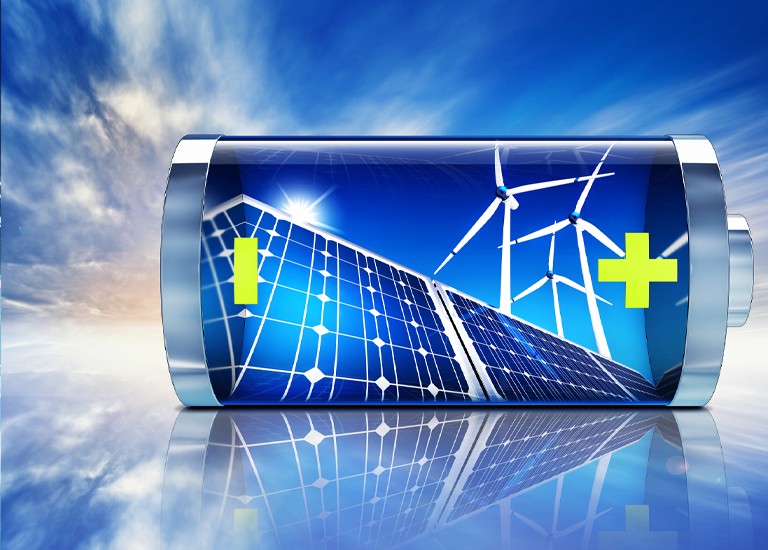Energy storage is a complementary technology for renewable energy systems and other power generation or backup systems.
For example, power generators on the electricity grid may produce surplus energy at night when the load is low, and solar arrays may generate surplus energy at midday. Using energy storage, surplus energy stored during off-peak usage times can be put back into the power grid during peak usage times.
Battery storage is perhaps the most well-known type of energy storage. Two battery technologies used widely today are lithium-ion batteries and redox flow batteries. Another type of electrical energy storage is a supercapacitor. New energy storage technologies are part of today’s ecosystem of clean energy research and development.
Energy storage technologies can be categorized in many ways, including by what kind of energy goes into the storage device and how the storage device stores the inputted energy. A battery, for example, receives electrical energy and converts it to stored chemical energy. A flywheel storage system uses a rotor connected to a motor-generator to convert electrical energy to and from rotational mechanical energy. A gravity reservoir system converts pumped fluid into stored potential energy. Thermal batteries store heat energy, perhaps from geothermal or solar sources. The possibilities are multifold.
Advances in energy storage will enable useful advancements in other technologies. Volatile power sources, surges in electricity demands, and increasing use of electric vehicles require a robust and responsive power grid. At the same time, some of the most attractive green energy technologies can be limited by source volatility. As the world adopts renewable and clean energy sources, such as wind and solar power, their variable nature means that having the ability to store previously generated electrical power for use when these sources are absent is increasingly important.
Many universities and private companies are currently researching novel energy storage solutions, including more efficient battery materials and advanced manufacturing systems. Advanced controllers are being used to improve battery performance. Our firm has the technical background and experience to handle energy storage technologies in many fields.
We partner with our clients to identify and protect innovations in this important field through counseling, patent prosecution, licensing, and, where necessary, enforcement of valuable patent rights. Our professionals are fluent in the science and technology driving the explosion of innovation in this area, including in the fields of:
- Novel electrode and electrolyte materials
- Methods of manufacturing all-solid-state batteries
- Redox flow batteries (design and manufacturing)
- Alkali metal ion batteries (such as Lithium-ion batteries)
- Super capacitor materials
- Proton-Exchange Membrane (PEM) Fuel Cells
- Solid Oxide Fuel Cells
- Battery energy storage systems
- Grid scale storage
- Green hydrogen
- Electric vehicle batteries
- Residential batteries for solar energy storage
- Flywheel energy storage
- Fuel cell energy storage
- Solar power storage and transfer back to the utility grid
- Inverter Power Technology
- Power electronics
- Net Metering
For more information, please contact our team of professionals. Our legal experts have degrees, including many advanced degrees, in chemical engineering, electrical engineering, chemistry, materials science, and physics, and many have industry experience. This multidisciplinary perspective, combined with legal acumen and industry insight, provides our clients with the support they need as they develop, protect, and extract value from their innovations.












